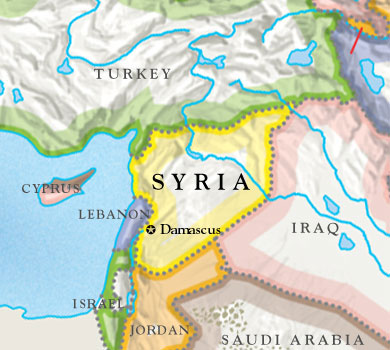 |
| Just not a whole lot of friends in the neighborhood |
But there is a corollary to this sort of unfettered ruthlessness in the name of wealth and power. The stakes are just as high as they can be. There are three possible outcomes: Successful retention of power, war crimes prosecution at the International Criminal Court in The Hague, or a hard death at the hands of the people you brutalized. There are no other options, and you have to be perfect - if you make a mistake, if you mis-calculate, mis-calibrate or mis-step, the game is over and the fall is a long one.
Syria is politically and diplomatically isolated, and any residual willingness among her neighbors to live and let live dissipated long ago in the blood and fire of Homs. Today she finds herself surrounded by hostile nations and governments, explicitly calling for regime change and even actively supporting the rebels fighting to topple the Baath government. While the al-Assad regime continues to receive support from Russia and Iran, they can do little but control events at the United Nations. The most important thing for the Baath leadership at this point is to keep the revolution and civil war as an internal matter, with as little regional or international involvement as possible. Anything that serves to 'internationalize' the conflict empowers the rebels and weakens the regime.
Which brings us to the utterly inexplicable events of Friday. There is no aerial threat to the Syrian leadership. The only air force attacking Syrian territory currently is the Syrian air force. This is clearly not the time for the regime to throw its weight around, picking fights with it's richer and better-armed neighbors. But whether somebody didn't get the memo and went off the reservation, or whether Bashir al-Assad is insane, a Syrian anti-aircraft battery shot down a Turkish F4 over the Mediterranean. There has been extensive back-and-forth over whether the Turkish fighter violated Syrian airspace, but that's just a red herring - whether it did or did not, it was almost unspeakably stupid for the Syrian government to choose now to antagonize Turkey, and in so doing, NATO. It makes it that much more difficult for Russia to continue to protect Syrian interests in the UN, and it opens the door to virtually any form of military action even without a UN Resolution, as it can now be couched in terms of retaliation.
So what will the Erdoğan government ultimately do? We can't know the specifics yet, but the important way to answer that question is "anything they want to". Because that's what al-Assad has invited with this pointless aggression. Anything Turkey wanted to do, from airstrikes to a humanitarian corridor inside Syria, they now can do. Syria has no control over what happens next, and importantly, neither do her few remaining allies. It does seem that Turkey is starting to see herself as the regional superpower, and as such an occasional opportunity to demonstrate a willingness to effectively use military power might be welcome as part of that strategy.
...
It'd be an interesting way for Turkey to further threaten Kurds.
ReplyDelete